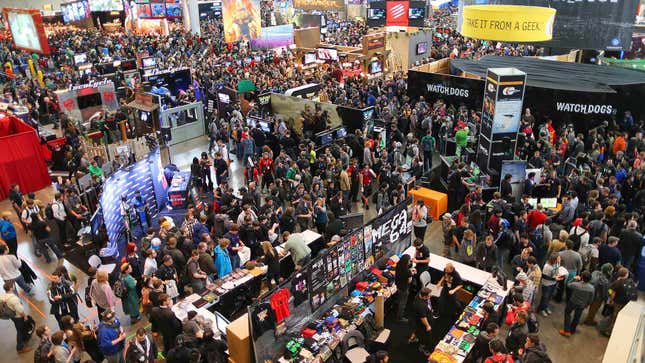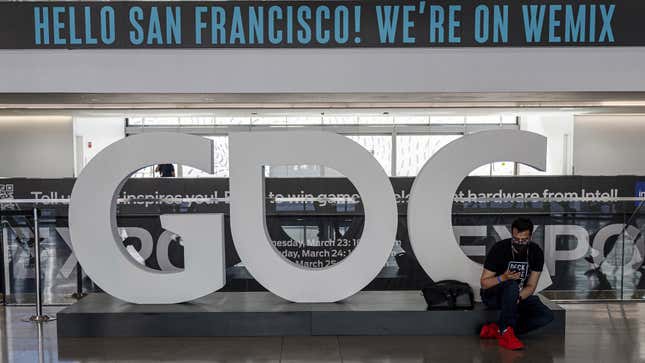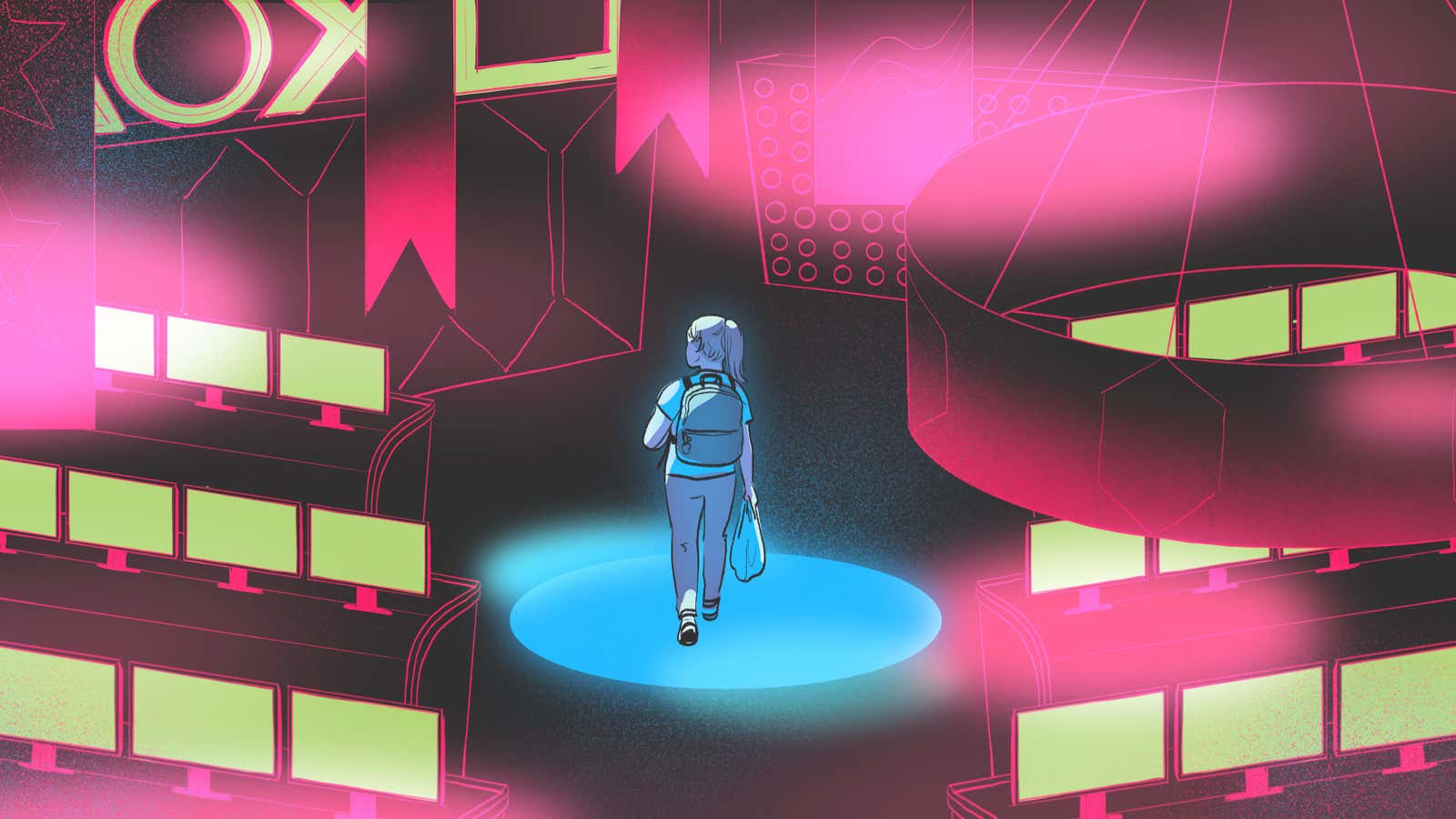Just days after the March 2023 Game Developer Conference came to a close, disturbing allegations started making the rounds on social media: The ultra-popular conference for game developers, held at San Francisco’s Moscone Center and attended by an estimated 28,000 people, was rife with sordid tales of abuse.
At an unafilliated afterparty in a nearby bar, one conference attendee reported having her drink roofied. And at least two women say they were assaulted by a man who lured them to a meeting under the guise of hearing a pitch. When all was said and done, at least six women alleged to have been drugged at the conference.
Read More: GDC Organizers Respond To Reports Women Were Drugged, Assaulted At Off-Site Events
The response from GDC organizers was swift: Within a few days, they posted a brief apology online. “We were saddened to hear of women reporting instances of harassment during GDC last week, particularly the serious allegations of drink spiking at a social event unaffiliated with GDC.” Organizers promised to do more to make GDC a “welcome and inclusive place.”
It was a familiar refrain. It’s been nearly a decade since the video game industry was rocked by Gamergate, a protracted, organized, and relentless harassment campaign against female gamers waged, in part, by members of the alt-right. And despite endless denunciations of it across the industry, along with promises to do better, women who attend gaming events and conferences say what happened at GDC is hardly surprising. Sexism among developers and gamers is still prevalent in Discord chats and subreddits; despite all the tough talk from the gaming establishment, the industry–and gaming conventions in particular–remains hostile to women and femme-presenting people.

Gamergate and game conventions
Nearly a decade ago, Gamergate and its menacing “toxic nerd” ideology had the video game industry by its throat. Prominent women who made games or championed more inclusivity in the space were harassed, threatened with sexual and physical violence, doxxed, and were otherwise made to feel unwelcome, all under the guise of “ethics in games journalism.”
Gaming was ripe for this kind of coordinated movement: Women have been historically underrepresented among both players and makers of video games. Even today the industry is composed of more than 60 percent men and only 38 percent women/non-binary folks, according to a recent International Game Developers Association study, and representations of women in games have been notoriously misogynistic. Couple that with the lack of safeguards for women and other vulnerable groups on social platforms and it’s not surprising that the industry became a nexus of very bad behavior.
But perhaps no pocket of the industry felt more menacing for women than gaming conventions. While attendees were often encouraged to cosplay their favorite characters, it often led to them being inappropriately singled out and mistreated. Women reported being stalked, subjected to crude jokes and innuendo, and unwanted sexual attention when attending cons.

In 2012, Jezebel reported that at NY Comic Con, cosplayer Mandy Caruso was allegedly degraded during an interview while dressed as Marvel superhero Black Cat. (The convention wouldn’t roll out a rigorous no-tolerance policy for harassment for another two years.) In 2013, women cosplaying as Tomb Raider protagonist Lara Croft at PAX East were harassed by a reporter covering the event, as reported by The Mary Sue.
Still, GamerGate exposed an urgent need for change that seemed to find meaningful support in the industry. There were reasons to be hopeful. “How the ‘Cosplay is Not Consent’ Movement Changed New York Comic Con,” read a 2017 headline from the now-defunct Mic. It seemed like things might change.
Yet just a year later, gaming influencer Quin Martin arrived for their volunteer shift at the Tiny Build booth at PAX East 2018 and was told by a man working there that they needed to change into a branded shirt.
Though Martin says there weren’t any other volunteers wearing branded shirts, they obliged, and went into an enclosed area of the display to change, as instructed by the man working there. “He said he would throw the shirt over the wall. I took my top off and he walked in without knocking and was laughing and said there weren’t any shirts and that he was ‘trolling,” they told Kotaku over email.
Martin didn’t return for their second shift the next day. Afraid of losing their footing in the gaming industry, they told the event coordinator they had an emergency and wouldn’t be returning. “She blacklisted me,” Martin says. Two years later, they opened up about what actually happened on Twitter.
“We had investigated this situation in 2020 following a social media post, and the employee in question had already been terminated for inappropriate behavior—which we have a zero tolerance policy for,” Tiny Build told Kotaku in response to an email asking about the incident. Martin was never told who the person was.

Game conventions in the last few years
While organizers and attendees became much louder in their repudiations of inappropriate behavior towards women and femme-presenting people at cons in the years leading up to and after GamerGate, the behavior clearly continues, according to nearly a dozen interviews Kotaku conducted over the last three months.
Though covid-19 forced in-person conventions to go virtual after PAX East 2020, they are slowly returning, and with them, a worrying return to form when it comes to women’s experiences.
Noel Steslicki, a full-time Twitch streamer, shared her frustrating experience at PAX East 2023 on Twitter. A potential partnership fell through after her contact at the company asked her out on a “personal dinner.” Though the conversation seemed professional at first, with the company letting her know what booth they’d be at on the convention floor and making plans for a business dinner, the employee eventually said it was “like a date.” Steslicki said she ended the professional relationship, and tweeted “don’t ask your clients out on dates. Please.”
At this year’s GDC, a 24-year-old first-time attendee who works in marketing (she requested anonymity) spoke at an officially sanctioned talk. She was “buzzed for the experience,” but told Kotaku via Discord DM that it quickly became clear that “any woman on her own, lingering around any place too long was gonna have to deal with men being weird.”
Though it was a business trip, she says she was continuously hit on by male attendees. “Day one on my own I had two people ask me out—one within the conference, one right outside. Both times were super uncomfortable,” she explained. “Chats that I thought were professional turned into ‘let’s get lunch / give me your number’ type things.” It was only on the second day, when she was accompanied by a male colleague, that she noticed a discernible difference. “Of course everyone was polite, nice, professional, and not weird.”
Game conventions and drink spikings
Convention afterparties, often sponsored by brands and set in local bars, clubs, and restaurants, are as much a part of the experience as the on-site programming. At some of the leading gaming conventions, women warn each other to stay alert and always keep an eye on their drinks.
Even before this year’s GDC, where a woman had her drink spiked at an unaffiliated afterparty (confirmed to Kotaku by the party’s hosts), similar stories played out at other top gaming conventions. At Pax East 2020 in Boston, Twitch streamer and gaming specialist at the Wounded Warrior Project Sam Seum says she attended an afterparty for a major company (she would not say which) and accepted a drink from a man who one of her female companions knew. That’s when things got scary.
“I remember going up to [one of my guy friends] because I started not feeling very good, and asked if he could get a Lyft back to the hotel,” Seum tells Kotaku over phone call. “And as we headed down the staircase, I tried to take the first step down and I just couldn’t. I felt like I was losing my ability to walk or stand.”
Her friends helped her into a taxi waiting for them outside the venue. “Before we even took off, I guess I fell onto [one of my other] friends…he did what he could to try and wake me up, he even tried to check my breathing, and it was really shallow to the point where he thought it had stopped.” Her friends called an ambulance. Seum remembers waking up in the hospital seven hours later.
When asked for comment, Acer’s director of media relations, Lisa Emard, told Kotaku: “We were deeply troubled by the reports we saw on Twitter about assaults at PAX East and the Predator After Party in 2020. The safety and well-being of all our guests at Acer and Predator events is absolutely paramount.” Emard said the team “reached out to Boston law enforcement to try to alert them about the situation.” At that particular party, Emard assured Kotaku that steps were taken to ensure drugs weren’t taken in, including “pat downs and bag checks…at the front door.”
On Twitter and in private Discords, women attending gaming conferences are warned about attendees spiking their drinks. In fact, this kind of illicit activity is so commonplace that Twitch streamer Artiie actually springs for drink test kits which she buys in bulk and hands out at cons.
“I became so frustrated that event organizers were not making a change to improve our spaces and decided to take action myself,” she explains via email. She usually attends all convention events as part of a group, to further ensure her safety. But before an event, she says she’ll spend some $300 for over 250 kits. (Amazon sells inexpensive test strips in bulk.)
When asked for comment on druggings at their events, PAX East sent this statement to Kotaku:
It is incredibly disappointing and disheartening to hear about the drink spikings at off-site third-party events surrounding game industry conventions, including one we had no affiliation with outside of PAX East 2020 where the reported drugging you are referencing took place. We in the strongest terms condemn any infringement on an individual’s bodily autonomy.
We recommend any organizations thinking of hosting a party to ask themselves if they will be able to do so safely and reconsider. Likewise if anyone is a victim of this type of criminally predatory behavior, please report it to law enforcement and the party organizers.
PAX has a zero tolerance policy for drugs and all forms of harassment. We provide multiple resources for attendees to immediately report violations against our code of conduct via phone, text, or our mobile app. At every event we conduct bag checks and have drug detecting dogs, as well as uniformed and undercover police, security, and our invaluable enforcer community on site to do our best to provide a self and welcoming environment for all.
The organizers would not answer specific questions.
Making game conventions safer in the future
After the reports emerged from GDC, Women in Games CEO Marie-Claire Isaaman published this statement on the group’s website: “We are going backwards as an industry! None of this is okay, none of this should be happening! If you ever hear anyone questioning whether Women in Games is relevant today—this is it!”
Online, as reports of abuses at this year’s GDC began circulating, many users recommended the Games And Online Harassment Hotline which offers anonymous, confidential and text-based support for victims and their allies. Founded by Feminist Frequency’s Anita Sarkeesian, one of GamerGate’s more prominent victims, the hotline kicked off in the summer of 2020 on the heels of gaming’s #MeToo movement.
“We were seeing a kind of spotlight moment where a lot of stories were coming out from all over the decades of abuse and violence and sexual assault that just has been really pervasive through the industry,” Feminist Frequency programs manager Jae Lin tells Kotaku over video call. “In that moment of heightened visibility and attention towards this issue, [Anita] just started talking to anyone who would talk asking ‘how can we leverage this moment? What can we do? What’s missing’?”
At PAX East 2023, the hotline partnered with the AFK Room and Take This, which sponsored a “decompression room” where attendees could go and relax away from the bustling show floor. Mental health professionals were also on hand, and the Games Hotline extended its service hours to cover the entire event.
The Hotline has two main focuses: providing a space for people to anonymously seek support, and supporting a non-anonymous group of those who have done harm. The latter bit is what Lin calls “transformative justice,” and it’s this work that has them most hopeful for enacting profound change in gaming culture.
In April 2022, the hosts of the Nordic Game conference announced the enactment of a whistleblower program that allows people who witness sexual harassment at conventions to anonymously report it. This came after “disturbing incidents” were reported to then-program director Jacob Riis, who ultimately stepped down in wake of the reports. The managing director, Eirk Robertson, promised to do better, and urged convention hosts to “train [their] staff” and “make [their] code of conduct clear” in an open letter on the Nordic Game site.
But lasting change requires even more work than anonymous reporting and codes of conduct—it requires cultural change. Lin hopes to increase the membership of the support community, and wants the Hotline integrated into more industry events, to provide support for those who need it and hopefully discourage people from acting in harmful ways—which means convention hosts, notoriously reluctant to discuss the premise of harassment at their events, need to be comfortable having these kinds of conversation.
“Let’s do some prevention, let’s talk about ways we can care for each other as a community,” they said.
Update 06/09/23 at 11:10 a.m. PT: The story was updated to clarify that the afterparty was unaffiliated with GDC.
